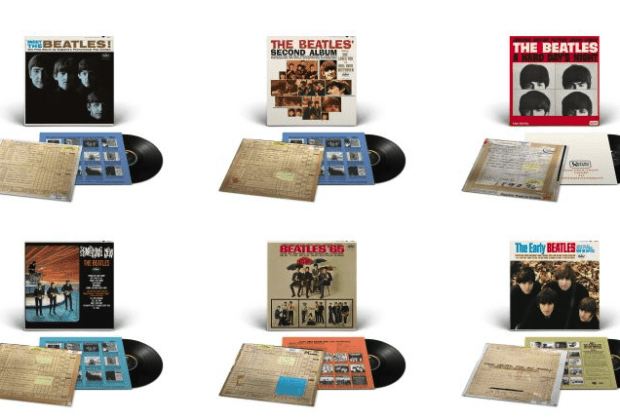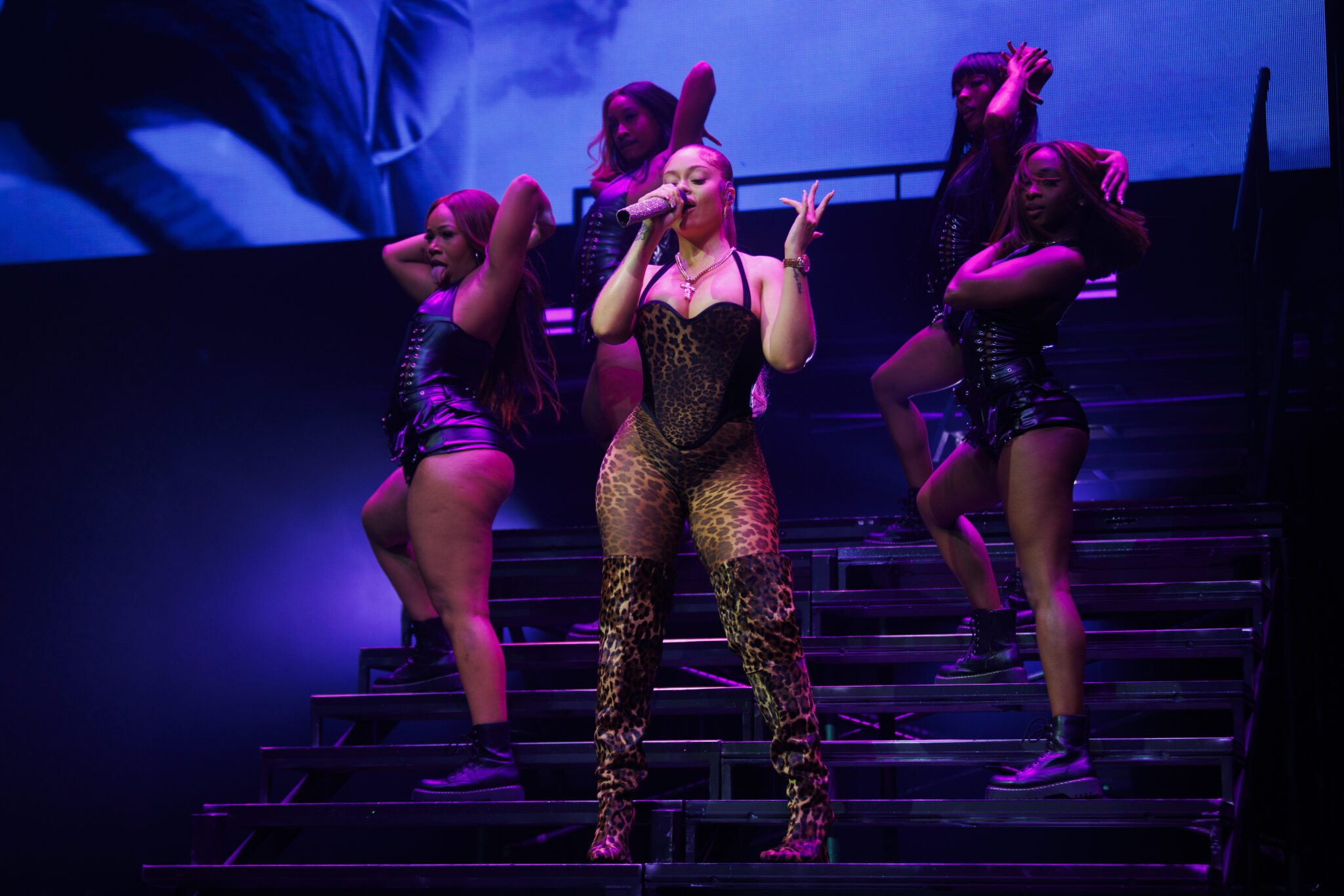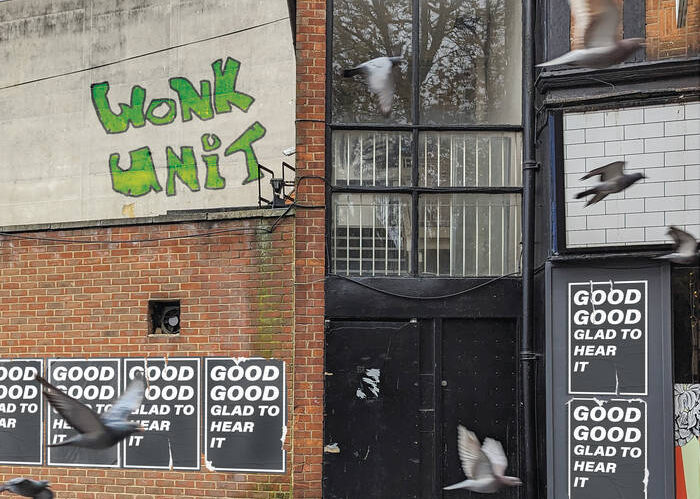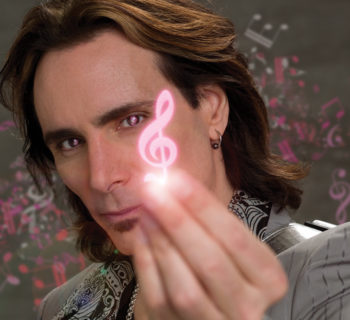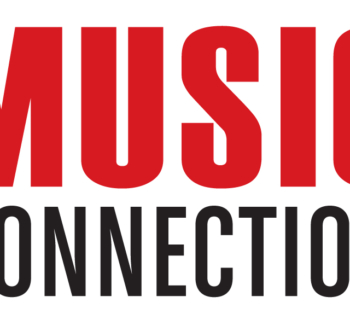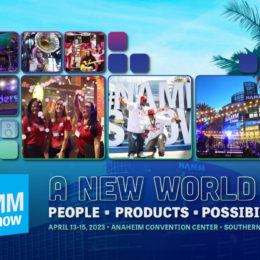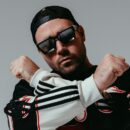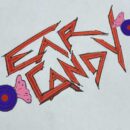PREORDER / BUY LINKS
The Beatles: 1964 U.S. Albums In Mono (box set) - https://thebeatles.lnk.to/1964USAlbumsPR
- Meet The Beatles! - https://thebeatles.lnk.to/MTBPR
- The Beatles’ Second Album - https://TheBeatles.lnk.to/SecondAlbumPR
- A Hard Day’s Night (Original Motion Picture Sound Track) - https://thebeatles.lnk.to/HardDaysNightPR
- Something New - https://thebeatles.lnk.to/SomethingNewPR
- The Beatles’ Story (exclusive to box set) - https://thebeatles.lnk.to/1964USAlbumsPR
- Beatles '65 - https://thebeatles.lnk.to/Beatles_65PR
- The Early Beatles - https://thebeatles.lnk.to/TheEarlyBeatlesPR
Originally compiled for US release between January 1964 and March 1965 by Capitol Records and United Artists, seven Beatles albums have been analog cut for 180-gram audiophile vinyl from their original mono master tapes that was issued on November 22 by Apple Corps Ltd./Capitol/UMe.
Out of print on vinyl since 1995, the seven mono albums are available now for preorder in a new eight-LP box set titled The Beatles: 1964 U.S. Albums In Mono, with six of the titles also available individually.
Apple Corps Ltd/Capitol UMe touted the titles.
“All seven albums – Meet The Beatles!; The Beatles’ Second Album; A Hard Day’s Night (Original Motion Picture Sound Track); Something New; The Beatles’ Story (2LP); Beatles ’65; and The Early Beatles – feature faithfully replicated artwork and new four-panel inserts with essays written by American Beatles historian and author Bruce Spizer. The albums’ new vinyl lacquers were cut by Kevin Reeves at Nashville’s East Iris Studios. The box set collects the seven albums, and all except The Beatles’ Story are also available individually.
Dr. James Cushing, poet, deejay, presented his theory to me why the Beatles were available to America in February 1964.
“I begin with the poetic notion that the ritual reappearance of a Dionysian hero—young, sexy, full of vitality and signaling the return of spring—was key to the deeper meaning of JFK, and the reason so many people (women especially) loved him despite his political ineffectiveness as president.
“He had hair, he had erotic charisma, he had TV stardom and a great voice—and then, as it must with all Dionysus stories, tragedy struck. Author Don DeLillo wrote that Dallas ‘broke the back of the American Century.’ End of this Dionysus cycle? Apparently so...and then, seemingly out of nowhere (Liverpool?), on The Ed Sullivan Show, two months and two weeks after November 22, 1963, on the same TV that gave you JFK, we get—who could have predicted it?—four Dionysian heroes who wear the garb of the singer Orpheus!
“My God, the hand of fate traded Kennedy for the Beatles! And so, they blended Dionysian ecstatic energy with Orpheus’ romantic loyalty to Eurydice for an erotically unbeatable moment.
“It was a period post–Dwight Eisenhower and now post–John F. Kennedy. America was still in mourning for John F. Kennedy, and we were all still feeling freaked out about the Russians on a Bay of Pigs level. Plus, the whole question about civil rights and civil rights for Negroes were still a bunch of big issues.
“Everything on the news was challenging. Everything was tragic and everything was a bummer. And the postwar period had been primarily one of anxiety and conformity, with a few interesting rebels that stood out, like Allen Ginsberg and Elvis Presley,” posed Cushing.
“It was the reality that now we had something positive and enthusiastic. Something that gave a kind of grand permission to let all those bottled repressed feelings out. Here was permission to shake your hair, scream and go crazy. There was a sense of tremendous cool, positive energy, tremendous potential for excitement, tremendous permission. Everything about the joy of romance that can happen in public was happening there with the Beatles.
“The girls who went to the Ed Sullivan Theater or the Washington D.C. Coliseum or the Hollywood Bowl or Shea Stadium were not going to hear a concert of popular music but to worship an ancient hairy deity in its four-bodied form. Their screams are so loud because years of sexual frustration lie behind them. In looking at footage from this period, it’s the girls who are most compelling as they shatter into ecstasy while the boys smile and maintain Olympian cool,” concluded Professor Cushing.
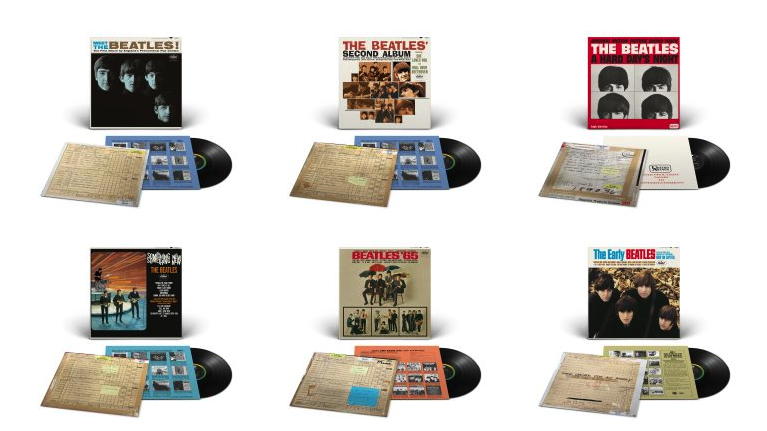
In his SiriusXM satellite radio duties, deejay and guitarist in Bruce Springsteen & the E Street Band member Steven Van Zandt programs Beatles’ recordings, devotes shows to them, and spins their catalog on vinyl and in mono on his Underground Garage channel.
Regarding the Beatles in mono, Steven added, “there was something physical as well that the analog medium communicated that digital never will,” reinforced Van Zandt.
“It doesn't really matter of course unless you’re listening to it on vinyl anyway and we know whatever they used will be a relief compared to the various, sometimes absurd, and usually terrible stereo versions.
“I had probably five lengthy conversations with [Apple Records’] Neil Aspinall over the last ten years of his life. In every one I begged him to put out the original configurations in the original mono. At first, he couldn’t quite understand why I was so passionate about it. By the third conversation he realized I was never going to stop bugging him about it and started seriously considering, not if, but when it could get done. He always had one distraction after the other, the Las Vegas thing [LOVE] took a lot of his time, but I'm sure he put it in motion before he left us. Anyway, I'm very very glad it got done.
“So now our masterpieces have been restored, and our leaders once again assume their proper place as our standard bearers. And peace returns to Pepperland.”
Also scheduled for late November is a new documentary on the Beatles. Disney+ announced that Beatles ’64, an all-new documentary from producer Martin Scorsese and director David Tedeschi, will stream exclusively on Disney+ that began November 29, 2024. The film captures the electrifying moment of the Beatles’ first visit to America. Featuring never-before-seen footage of the band and the legions of young fans who helped fuel their ascendance, the film gives a rare glimpse into when The Beatles became the most influential and beloved band of all time.
Harvey Kubernik is the author of 20 books. Sterling/Barnes and Noble in 2018 published Harvey and Kenneth Kubernik’s The Story Of The Band: From Big Pink To The Last Waltz. In2021 the duo wrote Jimi Hendrix: Voodoo Child for Sterling/Barnes and Noble.
Otherworld Cottage Industries in 2020 published Harvey’s Docs That Rock, Music That Matters. He is currently writing Screen Gems: (Pop Music Documentaries and Rock ‘n’ Roll Television Moments) for 2025 publication.
Kubernik is in several book anthologies, most notably, The Rolling Stone Book of The Beats and Drinking With Bukowski. Harvey wrote the liner notes to CD re-releases of Carole King’s Tapestry, The Essential Carole King, Allen Ginsberg’s Kaddish, Elvis Presley The ’68 Comeback Special, The Ramones’ End of the Century and Big Brother & the Holding Company Captured Live at The Monterey International Pop Festival.
During 2006 Harvey spoke at the special hearings initiated by The Library of Congress held in Hollywood, California, discussing archiving practices and audiotape preservation. In 2017 Kubernik appeared at the Rock and Roll Hall of Fame in Cleveland, Ohio, in their heralded Distinguished Speakers Series.

